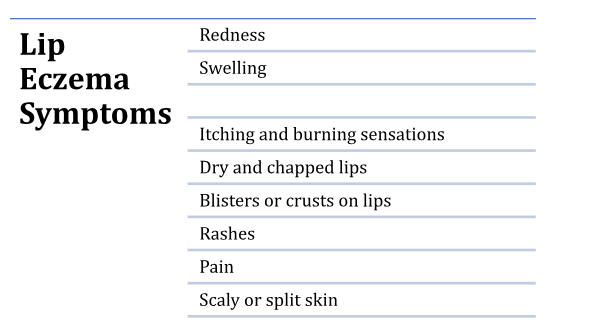
Lip eczema, also known as lip dermatitis or eczematous cheilitis can turn your lips red and dry or even cause scaling. You can consider this condition a more severe form of chapped lips. Young children, especially between the ages of 1 to 4 years, are more prone to eczema. It affects around 20% of children and 10% of adults.
Understanding the causes and symptoms of lip eczema will help you take proper preventive measures and follow early treatment plans.
Synopsis
Different Types of Lip Eczema
Lip eczema can be of various types depending on different characteristics and causes.
-
Contact Dermatitis: Direct contact with allergens may cause this condition. This usually occurs because of cosmetic products or food particles.
-
Atopic Dermatitis: This chronic inflammatory skin condition may also affect your lips. It may cause itching, redness, and dryness. You will be more susceptible to this condition if you have a history of atopic dermatitis.
-
Seborrheic Dermatitis: This condition may create scaly and greasy patches on your lips. Stress or hormonal changes may often increase the yeast level on your skin. This, in turn, may result in seborrheic dermatitis.
-
Dyshidrotic Eczema: It may cause tiny blisters on your lips with itchiness and inflammation. This condition is often the result of different environmental factors and stress.
Common Symptoms of Lip Eczema
Lip eczema may affect both your lips or either one. Sometimes, it may even spread to the skin surrounding your lips. The inner mucous membrane is affected by lip eczema only in rare cases.

Having an understanding of these symptoms will help you quickly identify the condition. Therefore, visiting an expert medical professional as soon as possible is important to start treatment.
Consult our dermatology hospital in Bangalore if you are experiencing eczema on lips symptoms.
Causes and Triggers of Lip Eczema
-
Environmental Factors
Weather conditions may hugely affect your skin. Increased exposure to the sun or excessive cold may irritate your lips and you may find them turning dry. The wind carries different particles, some of which may cause allergic reactions, thus resulting in lip eczema. If you are allergic to certain food items, that may also cause lip eczema.
-
Irritants in Lip Care Products
Makeup products often contain specific chemicals that may irritate your skin. This list does not just include makeup or lip care products; it may also include mouthwash or toothpaste.
-
Genetic Predisposition
Your risk of developing lip eczema increases if you have a family history of this condition or any other skin issues. Staying aware of your genetic conditions may also help you maintain caution.
-
Autoimmune Factors
If you have a weak immune system, your lip eczema risk increases. This is especially true for disorders like atopic dermatitis.
Some other causes of lip eczema include:
-
Constant biting or licking of lips
-
Using tobacco
-
Hormonal level fluctuations
-
Smoking
Try to restrict the causes that are in your control to protect yourself.
Diagnosing Lip Eczema
When in doubt regarding lip eczema, visiting a dermatologist is best. They will check for inflammation and irritation in your skin to detect the issue. The diagnosis may include an analysis of your medical history, skin patch, or prick test to diagnose allergic conditions, along with blood tests and urine samples. Sometimes, the doctor may also recommend a skin biopsy. This is usually done to eliminate the chances of other severe skin problems.
Treatment for Lip Eczema
Here are some major eczema on lips treatment options:
-
Topical Corticosteroids and Ointments
Applying these medications to your affected area can reduce inflammation, redness, and itching. However, we suggest you visit a dermatologist before self-medicating and follow the strict guidelines while using them.
-
Moisturisers and Emollients
These products help maintain your lips’ hydration. Acting as a protective layer, they can prevent the loss of moisture. You can use them regularly or as recommended by a dermatology specialist.
-
Antihistamines for Itching
These medicines are usually taken orally. They can help soothe your itching symptoms.
Preventive Measures of Lip Eczema.
We have also listed some effective precautionary methods that you can easily practice at home to reduce the risk of lip eczema.
-
Proper Lip Care Routine
Use petroleum jelly to protect your lips from getting chappy. Check the ingredients used in your cosmetic products. Refrain from using the ones that contain harsh chemicals. It is always advisable to patch-test your cosmetic products before using them liberally.
-
Avoiding Triggers and Irritants
Identify the food items or environmental products that irritate your skin. Try to avoid them. If you are forgetful, keep a handbook with a list of all those allergens.
-
Hydration and Nutrition
Lifestyle and dietary changes may contribute a lot to protecting you from developing lip eczema. These measures may include:
-
Vitamin and nutrient-rich diet
-
Proper hydration
-
Avoiding tobacco (smoking and having)
-
Not stressing out over little issues
You can visit Manipal Hospital Malleshwaram, Bangalore, to consult our best dermatologist in Bangalore for eczema on lips treatment.
FAQ's
No, lip eczema is not contagious. Even though it can spread in your own body, it cannot infect any other person.
The severity and treatment options may influence your healing time. For the best outcome in the shortest timespan, follow the preventive measures and your doctor’s guidance.
Sometimes, the signs may not necessarily mean you have lip eczema. Other conditions with the same symptoms may include:
-
Chapped lips
-
Cold sores
-
Pimples
-
Canker sores
So, do not panic right after the signs. Consult your doctor to know what is the issue you are facing.



















 5 Min Read
5 Min Read












